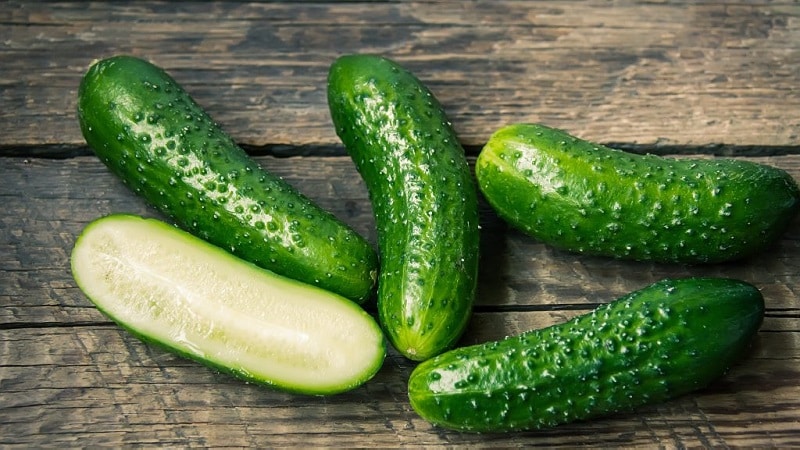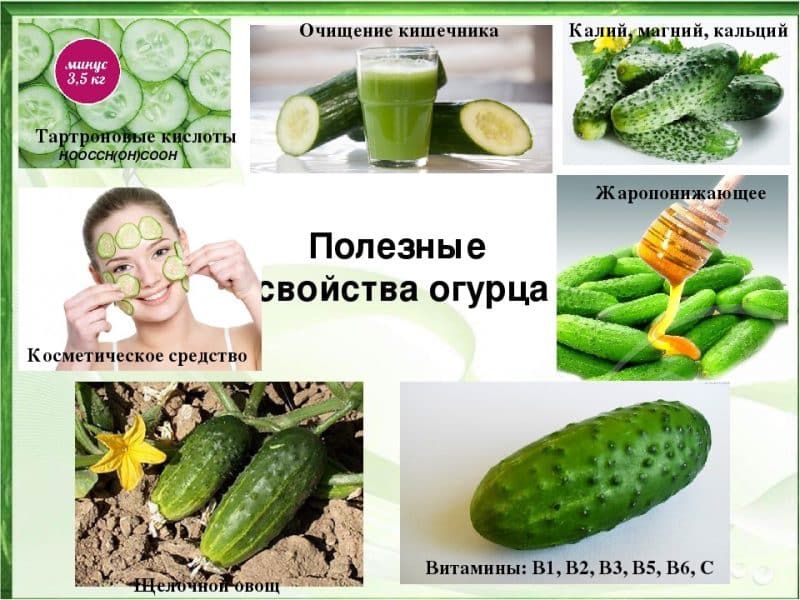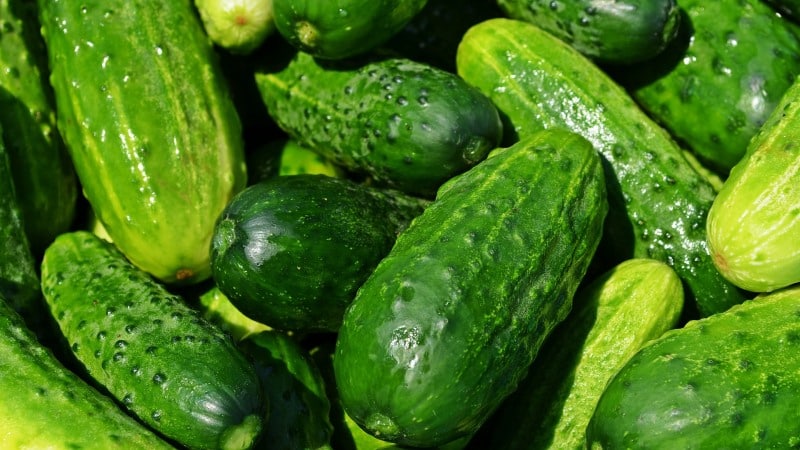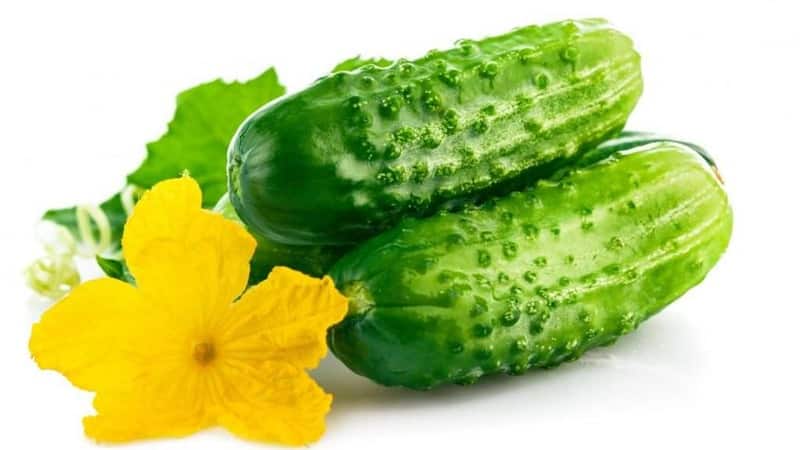The benefits and harms of cucumbers for human health
Biologists consider cucumbers to be a false berry. The fruits, like their cousins watermelons, are 95% water, but are not sweet and cannot be called fruits. These are the only fruits of the pumpkin family, which for several millennia have been consumed only in their unripe form. Cucumbers are widely popular in cooking, cosmetology, and dietetics.
The article will tell you what benefit and harm cucumbers for humans.
Calorie content and chemical composition of cucumber

Despite the high percentage of water contained in the fruit, the product contains many useful compounds:
- organic acids (tartronic, folic and others);
- macroelements - calcium, magnesium, sodium, potassium, phosphorus, chlorine, selenium, silicon;
- trace elements - iron, zinc, iodine, copper, manganese, selenium, fluorine;
- pectin;
- carotene;
- vitamins - PP, A, groups B, C, E, K.
Calorie content per 100 g is 14 kcal.
- proteins - 0.8 g;
- fats - 0.1 g;
- carbohydrates - 2.5 g;
- fiber - 1 g.
Benefits of cucumbers

Including cucumbers in your diet is beneficial at any age. The vegetable has a general beneficial effect on the body.
Let's consider the benefits of cucumbers for women:
- used in dietary nutrition;
- strengthen hair and nails;
- cucumber-based masks smooth out wrinkles and refresh the skin;
- The fruits are used as a laxative during pregnancy and lactation.
Men use fresh fruits as a remedy:
- prevention of prostate and urinary system cancer;
- strengthening memory in adulthood and improving thought processes;
- relieving muscle pain during heavy physical exertion, in most cases among athletes;
- from hair loss;
- stimulating the production of testosterone in sexually mature adults at any period of life.
Cucumbers are also useful for children, as the compounds in their composition contribute to:
- full development of the skeleton and joints, strength of hair, nails thanks to the element silicon, rare for plant products;
- prevention of anemia due to iron content;
- normal functioning of the thyroid gland, while natural iodine has a beneficial effect on mental activity;
- growth, as sulfur affects the division of muscle cells;
- strengthening the immune system;
- removing toxins from the body;
- bowel function.
The product is not given to children under one year of age. Other contraindications are gastritis, measles or enterocolitis.
Important. Salty and pickled cucumbers are contraindicated for patients with heart, kidney or liver ailments.
For older people whose bodies are overloaded with medications (and everyone else), cucumbers can partially replace anti-inflammatory drugs, such as aspirin or burn ointments.
Besides:
- they prevent muscle loss;
- resist osteoporosis;
- help prevent hypertension and cardiovascular diseases.
Benefits of cucumbers
Regular, but moderate, consumption of vegetables improves the general condition of even a healthy person and has a beneficial effect on almost all systems and organs.
To restore water balance:
- eliminate swelling, acting as a mild bile and diuretic;
- normalize water-salt balance.
For weight loss - tartronic acid regulates the number of calories, promotes fat burning and prevents its accumulation in muscle cells. In dietary nutrition programs, cucumbers are used as a low-calorie source of plant fiber.
To speed up metabolism:
- activate metabolism thanks to dietary fiber;
- have the ability to neutralize acidic compounds
For the digestive system:
- do not create a feeling of heaviness after eating;
- cleanse the liver, bring it into working condition;
- thanks to potassium and sodium, they help detoxify the body, as they break down and remove toxins;
- prevention of constipation.
For heart:
- normalize the functioning of the central nervous system;
- cleanse blood vessels;
- resist the formation of cholesterol plaques, which helps normalize blood pressure;
- improve hematopoiesis.
When treating diabetes, fresh fruits will also be useful, since they block carbohydrates, and the presence of zinc stimulates the production of insulin.

For therapeutic purposes, not only fresh cucumbers are used, but also pickled cucumbers, in which lactic acid was formed during the fermentation process, which adds beneficial qualities to the vegetables.
In addition, the low glycemic index in combination with vitamins and microelements has a beneficial effect on the functioning of the entire body:
- the functioning of the gastrointestinal tract improves;
- Toxins are removed, immunity is strengthened;
- the functioning of the endocrine system is supported due to the high percentage of iodine in the composition;
- strengthens the cardiovascular system
The norm for pickled cucumbers is no more than two per meal. You should not eat them at night, as they increase your appetite. In severe diabetes, consultation with an endocrinologist about diet is required.
For the endocrine system:
- facilitate the work of the pancreas;
- control the balance of thyroid hormones.
Small fruits, which are more saturated with ascorbic acid than others, are suitable for increasing immunity. If they are present in the diet throughout the fruiting period, the body will more easily tolerate colds during the cold season.
For beautiful skin:
- eliminate inflammatory processes, redness, acne, oiliness;
- promote rapid healing of wounds;
- make the skin soft.
Other:
- promote the dissolution of stones on the teeth and the removal of kidney stones;
- prevent diseases of the oral cavity;
- increase protein digestibility, thereby easing the condition of lung diseases and even tuberculosis.
Application in cosmetology and folk medicine

Many people know the healing properties of cucumber and recipes for remedies that use all parts of the vegetable, including seeds and juice. Taking them makes it possible to avoid a visit to the doctor once again.
Cucumbers are used:
- as a remedy for constipation;
- means for weight loss - fasting days are practiced on a cucumber diet;
- for skin irritation;
- to eliminate rashes, itching and the effects of burns;
- in the treatment of hepatitis;
- to relieve renal colic;
- for bronchitis and atherosclerosis;
- to stop bleeding (a decoction of the tops is used for oral administration).
Juice, crushed pulp, or just cucumber slices are used as a cosmetic product at home. They are used to moisturize, soothe, tighten, rejuvenate and heal the skin.
Cucumber masks work well to tighten the pores on the face.
In industrial cosmetology, masks, tonics, and creams intended for skin care are made from cucumber.
Important. If there are any defects on the skin (ulcers, wounds, scratches, lichen, etc.), it is not recommended to use cucumber-based products. If intolerance is detected, their use is prohibited.
Can it be used during pregnancy and breastfeeding?
For expectant mothers, cucumbers are highly desirable in the diet, but it is important not to overestimate their capabilities.
If consumed in excess, there is a risk of diarrhea and dehydration.
Correct use will only bring benefits:
- eliminate excess weight;
- compensates for iron deficiency;
- normalizes appetite;
- will relieve heaviness in the legs when walking.
Contraindications and harm
A few contraindications for use:
- intolerance;
- peptic ulcer and gastritis during exacerbation;
- renal failure;
- diarrhea caused by infection or ingestion of incompatible foods.
When breastfeeding, a mother can eat no more than 200 g of fresh cucumbers; a larger amount can lead to excessive gas formation in the baby.
Rules of use
To properly consume cucumbers, it is worth knowing the answers to three questions.
Is it possible to eat with the peel?
The concentration of nutrients in the peel of cucumbers and any other vegetables and fruits is higher than in the entire fruit. But the rule only applies to summer cucumbers. Fertilizers (mainly nitrates) collect in the skins of early spring fruits, so it is best to get rid of them to be safe.
Important! Early cucumbers are contraindicated for children under three years of age, even peeled ones.
Is it possible to eat at night
Vegetables are digested quickly, and two cucumbers will not add weight to the body. But most people eat them with salt, and this causes thirst, leads to excessive fluid intake, thereby disrupting sleep.
How many cucumbers can you eat per day?

In order not to harm yourself, on average you can eat no more than 1 kg of cucumbers per day (approximately 2-3 cucumbers at a time).
Recommendations
When buying cucumbers at the market or in a store, consider the following nuances:
- the tail should not be limp (a sign of a long-plucked fruit);
- color bright green;
- the fruit should not shine;
- Large fruits contain a lot of water and seeds, but the pulp contains few useful substances;
- the fruit without chemicals smells only of fresh cucumber and nothing more.
To be sure of safety, you should buy cucumbers only from reliable, trusted sellers at the market or in a store.
This is interesting:
The benefits and harms of cucumber pickle for the body.
Features of pickling cucumbers with citric acid: recipes for 1 and 3 liter jars.
Conclusion
You can get your daily fluid intake by eating a few fresh cucumbers. The vegetable has anti-inflammatory properties and is used in the treatment of coughs, acute respiratory viral infections, and for the treatment and pain relief of burns and wounds.
Drinking freshly squeezed juice will help with diseases of the liver, cardiovascular system (especially hypertension and arrhythmia), as well as bronchitis, diabetes, and obesity.